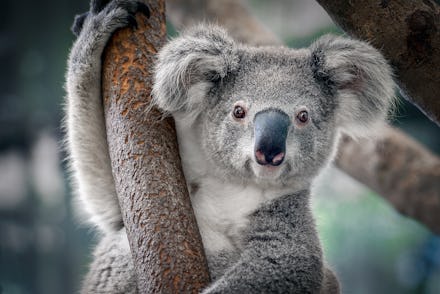A new report says koalas may go extinct in our lifetime

Koalas: they're cute, not as cuddly as you'd hope, and, by the time Generation Alpha grows up, possibly will no longer exist. Recently, The Australian Koala Foundation (AKF), a nonprofit organization working towards saving koalas and their habitats, announced that it now considers koalas functionally extinct, meaning the declining amount of the species makes them no longer a contributing part of the ecosystem to which they were once central.
“The AKF thinks there are no more than 80,000 koalas in Australia," Deborah Tabart, AKF chairman said in a May 10 news release. "This is approximately 1% of the 8 million Koalas that were shot for fur and sent to London between 1890 and 1927." Though 80,000 may sound like a large number, it's quite small for an indigenous animal population, and AKF predicts that koalas will not survive to reproduce for another generation. Similarly, the World Wildlife Fund predicts an end for koalas by 2050, just 31 years from now.
Because of the fast decline, the AKF is pushing for Australia's next Prime Minister (the election is Saturday, May 18) to enact the Koala Protection Act (KPA). The policy, which has been in the works since 2016, calls for federal protection of koala habitats, including the eucalyptus trees they rely on for food and shelter. Koalas only reside in certain parts of Australia, and are not found in the wild outside the continent. Since 2010, AKF has monitored 128 Australian areas with koala habitats, and in that time, the species has gone extinct in a whopping 41 (that's 32%) of those places.
Deforestation, climate change, human interference and STDs are all to blame for the drastically decreased population. As humans disrupt the environment more, koalas — which are typically found in the rural eastern and southeastern parts of Australia — are forced to live in more urban areas, where they can drown in swimming pools, get attacked by other animals or household pets, or get hit by cars while crossing the road. About 300 koalas are killed by car in South Queensland alone each year, according to the region's department of environment and heritage protection.
Koalas are dying out fast, and because counting koala populations isn't easy since they aren't sedentary creatures, are often tricky to spot, and a significant cluster of them live on privately owned Australian land, the current 80,000 estimate might not even be accurate. There may actually be far fewer koalas than we think currently in existence, and once the species reaches a critically low number — which is likely to happen sooner than later — they will not be able to reproduce at a sustainable rate, and go completely extinct.
If this does indeed happen, it'll probably be devastating to koalas' former ecosystem and food chain. While the exact effects of a species' extinction can't be known until experienced, any significant shift to the natural world inevitably has long-reaching effects. And sadly, extinction is becoming increasingly common; just last year, several types of bird officially ceased to exist, and both the Northern White Rhino and vaquita, a rare marine mammal, are on the brink of extinction, with few of each species left on the planet. They, along with koalas, might very well be next to go.
So what can you do to save the marsupials? For those who aren't Australian citizens and thus can't vote in the upcoming election, donate to organizations like The World Wildlife Fund or Save The Koala. Your money will go towards planting the trees that koalas need for food, as well as sponsoring the well-being of wild koala to help sustain them as their world as we know it changes.
In addition to koala-specific help, though, just try to be kind to the environment, wherever you are — the world may feel big, but remember that we all share it.